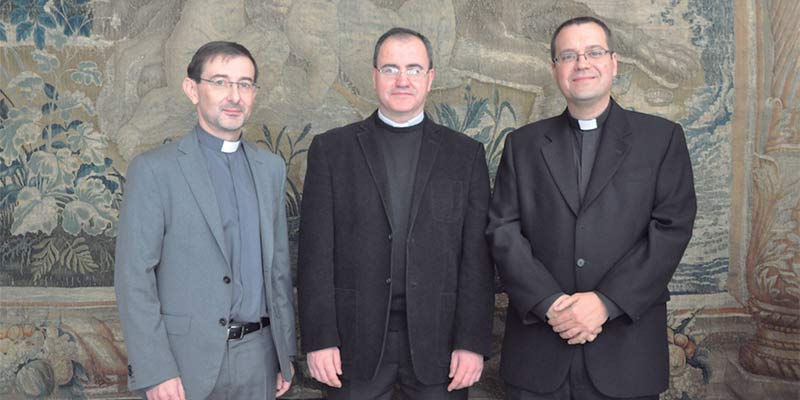On February 17, the three new auxiliary bishops of Madrid, appointed by Pope Francis to assist Cardinal Osoro, Archbishop of Madrid, in his pastoral work, were ordained.
Text - Rafael Miner
The new auxiliary bishops of Madrid are José Cobo (Jaén, 1965), Santos Montoya (Ciudad Real, 1966) and Jesús Vidal (Madrid, 1974). All indications are that Pope Francis has fully endorsed the candidates of Archbishop Osoro, who has especially sought to "men of faith", as he stated on December 29 in his appearance before the media.
The Cardinal Osoro thanked the Pope "for the answer you have given" to the proposal presented to him. Juan Antonio Martinez Camino, whom the Archbishop of Madrid sat next to him at the press conference and valued the "holiness ministry". that it carries out.
There are other common features the three new auxiliary bishops of Madrid. For example, they are university graduatesCobo, Law; Montoya, Chemistry; and Vidal, Economics and Business. The cardinal also underlined his pastoral profilein parishes, tanned in parishes "at the service of the people". Jesús Vidal is rector of the Conciliar Seminary of Madrid, and Santos Montoya was director of the minor seminary in Madrid.
Why now and not before or after? The cardinal explains that three years after "to have kicked myself all over the diocese"was the time to ask Rome for help from new auxiliaries "for a diocese as big as this one, with five million people". "The bishop has to be on a permanent visit to the communities." in order to "energizing Christian life". And this "it can't be done by one person", added the archbishop of Madrid, who in recent years has been promoting an ambitious Diocesan Evangelization Plan, reported by the Palabra magazine.
Parents and siblings
What does the Pope expect of the new auxiliary bishops? And his archbishop? And the priests? And the faithful of the diocese? These are legitimate questions that any faithful can ask, although bishops, priests and religious are also faithful; otherwise they would be unfaithful.
On his recent trip to Chile and Peru, Pope Francis received the episcopates of both nations. And a main thrust of his brief address to the bishops was this: "The paternity of the bishop with his presbyterate! A paternity that is not paternalism or abuse of authority. A gift to ask for. Be close to your priests in the style of St. Joseph."said the Holy Father to the Chilean bishops a few weeks ago.
This is nothing new. Last year, Peter's successor met with members of the Congregation for the Clergy. The French newspaper La Croix thus titled the meeting: "Pope Francis asks bishops to be 'fathers' to their priests". And he told it this wayHow many times have I heard the complaints of priests who cannot contact their bishop [...]. Every priest "he must feel that he has a father who is close," he insisted, because we cannot "make a priest grow and sanctify him without the paternal proximity of the bishop.""
Earlier, in 2014, in a lengthy address to the Congregation for Bishops dated February 27, Pope Francis spoke of. "praying bishops" and of "shepherd bishops", and traced "the following profile of candidates for the episcopate: 'That they be fathers and brothers; that they be gentle, patient and merciful; that they love poverty: interior as freedom for the Lord, and also exterior as simplicity and austerity of life; that they not have a 'princely' psychology...'"
These are the shepherds that the Pope gives us. Some traits combined with what he also emphasized to the Chilean bishopsThe lack of awareness of belonging to the People of God as servants, and not as owners, can lead us to one of the temptations that does most harm to the missionary dynamism that we are called to promote: clericalism. "Clericalism forgets that all the visibility and sacramentality of the Church belongs to all the People of God (Lumen Gentium9-14) [...] The laity are not our pawns or our employees. [...] Let us please guard against this temptation, especially in the seminaries and in the whole formation process, added the Pope. n







